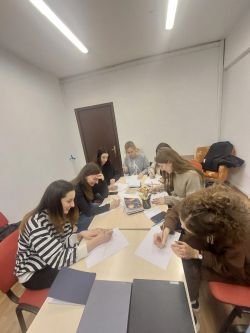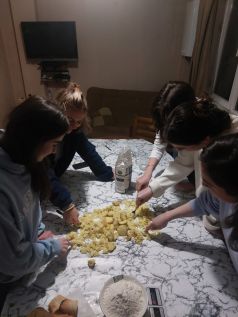European Solidarity Corps: a chance to learn, grow and discover the world: Difference between revisions
(VisualData update) |
No edit summary Tag: 2017 source edit |
||
| Line 5: | Line 5: | ||
}} | }} | ||
What is the '''European Solidarity Corps'''? The ESC is an opportunity for young people to volunteer abroad for a short-term or long-term project. By participating in the ESC, people up to 30 years old can spend a period abroad and volunteer for a non-profit organization. European Solidarity Corps is funded by the European Commission and aims at helping young people who want to get involved to improve their skills. | What is the '''European Solidarity Corps'''? The ESC is an opportunity for young people to volunteer abroad for a short-term or long-term project. By participating in the ESC, people up to 30 years old can spend a period abroad and volunteer for a non-profit organization. European Solidarity Corps is funded by the European Commission and aims at helping young people who want to get involved to improve their skills. | ||
| Line 11: | Line 10: | ||
The Institute works on multiple levels and that is why our activities as volunteers are quite diversified. More precisely, we cooperate with local and European NGOs to foster potential and future partnerships and encourage the international exchange between Georgia and Europe, with a clear focus on young people and the opportunities available for them, such as Erasmus+ and ESC projects. In addition, we are working daily to develop a new collaborative platform called WikiYouth which, once online, will be another tool for young people to get informed about work, volunteer, and training opportunities in the European framework. Here we also publish our articles that cover our experience as volunteers and other related topics. | The Institute works on multiple levels and that is why our activities as volunteers are quite diversified. More precisely, we cooperate with local and European NGOs to foster potential and future partnerships and encourage the international exchange between Georgia and Europe, with a clear focus on young people and the opportunities available for them, such as Erasmus+ and ESC projects. In addition, we are working daily to develop a new collaborative platform called WikiYouth which, once online, will be another tool for young people to get informed about work, volunteer, and training opportunities in the European framework. Here we also publish our articles that cover our experience as volunteers and other related topics. | ||
[[File:ICI - Italian class .jpg|thumb|334x334px|Italian class]] | |||
In order to support the Institute in its role, we are also actively promoting the Italian language and culture through our free Italian lessons. Among our students are young Georgians and Russians who are interested in learning the language for many different reasons: work, passion, study and … all of them are welcome. We always strive to keep a light and cheerful atmosphere where we teach grammar, vocabulary, and culture. The enthusiasm and curiosity of our students make up for the work that we do, and we are so grateful for this experience based on mutual exchange and endless discovery. To us, sharing our Italian culture and having the chance to discover their Georgian culture are the first steps to building a more inclusive environment where each of us can be an ambassador of our own customs and traditions. | In order to support the Institute in its role, we are also actively promoting the Italian language and culture through our free Italian lessons. Among our students are young Georgians and Russians who are interested in learning the language for many different reasons: work, passion, study and … all of them are welcome. We always strive to keep a light and cheerful atmosphere where we teach grammar, vocabulary, and culture. The enthusiasm and curiosity of our students make up for the work that we do, and we are so grateful for this experience based on mutual exchange and endless discovery. To us, sharing our Italian culture and having the chance to discover their Georgian culture are the first steps to building a more inclusive environment where each of us can be an ambassador of our own customs and traditions. | ||
[[File:ICI - Italian speaking club.jpg|thumb|318x318px|“La tradizione gastronomica italiana: cuciniamo insieme”]] | [[File:ICI - Italian speaking club.jpg|thumb|318x318px|“La tradizione gastronomica italiana: cuciniamo insieme”]] | ||
Revision as of 13:08, 4 April 2024
| Title | European Solidarity Corps: a chance to learn, grow and discover the world |
|---|---|
| Author | Eleonora Cozzolino, Paola Santaniello |
| Project | Empowering Youth |
| Date | 2024-02-29 |
What is the European Solidarity Corps? The ESC is an opportunity for young people to volunteer abroad for a short-term or long-term project. By participating in the ESC, people up to 30 years old can spend a period abroad and volunteer for a non-profit organization. European Solidarity Corps is funded by the European Commission and aims at helping young people who want to get involved to improve their skills.
We are Eleonora and Paola, both Italian volunteers in Georgia – or Sakartvelo (საქართველო) as Georgians would say. Here, we are carrying out an ESC project called “Empowering Youth” at Istituto di Cultura Italiana in Tbilisi, a non-profit organization active in the linguistic and literary field. The main aim of the Institute is to promote the Italian language and culture here in Georgia and, at the same time, spread the Georgian language and culture abroad. Moreover, the Institute takes part in the ESC program both as a sending and receiving organization. In short, thanks to European funds, it can host foreign volunteers in Georgia and send Georgian volunteers to European countries.
The Institute works on multiple levels and that is why our activities as volunteers are quite diversified. More precisely, we cooperate with local and European NGOs to foster potential and future partnerships and encourage the international exchange between Georgia and Europe, with a clear focus on young people and the opportunities available for them, such as Erasmus+ and ESC projects. In addition, we are working daily to develop a new collaborative platform called WikiYouth which, once online, will be another tool for young people to get informed about work, volunteer, and training opportunities in the European framework. Here we also publish our articles that cover our experience as volunteers and other related topics.

In order to support the Institute in its role, we are also actively promoting the Italian language and culture through our free Italian lessons. Among our students are young Georgians and Russians who are interested in learning the language for many different reasons: work, passion, study and … all of them are welcome. We always strive to keep a light and cheerful atmosphere where we teach grammar, vocabulary, and culture. The enthusiasm and curiosity of our students make up for the work that we do, and we are so grateful for this experience based on mutual exchange and endless discovery. To us, sharing our Italian culture and having the chance to discover their Georgian culture are the first steps to building a more inclusive environment where each of us can be an ambassador of our own customs and traditions.

Every other week we also held Italian-speaking clubs to practice the language in a fun and interactive way. “La tradizione gastronomica italiana: cuciniamo insieme” (“The Italian food tradition: let’s cook together”) has been the title of one of our speaking clubs. As you may have guessed, we had fun preparing a typical Italian dish from scratch and the participants had the opportunity to practice food vocabulary, learn a new recipe, and taste it firsthand. At the same time, our Georgian students showed us some traditions related to Georgian cuisine: the supra. This term is used to refer to the typical Georgian feast, during which the tamada is the one who guides the toast. What better way to combine the Italian and Georgian cultures?
That is why we ask ourselves one thing. What would the world be without diversity?